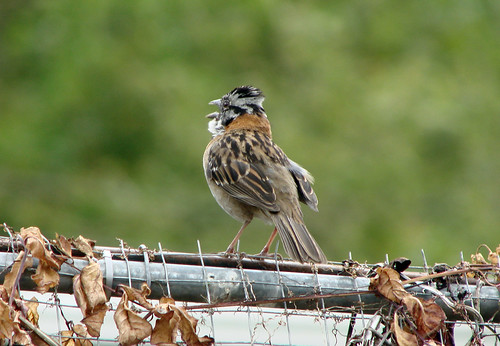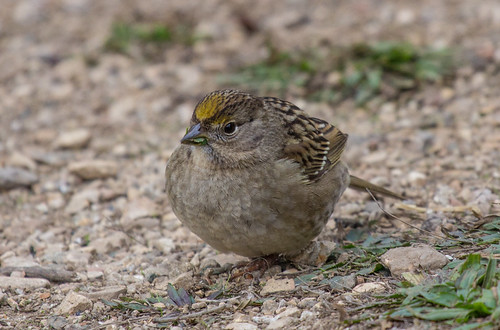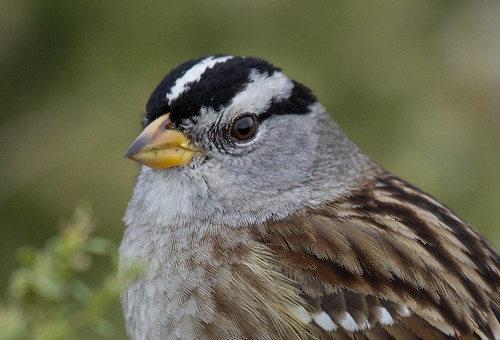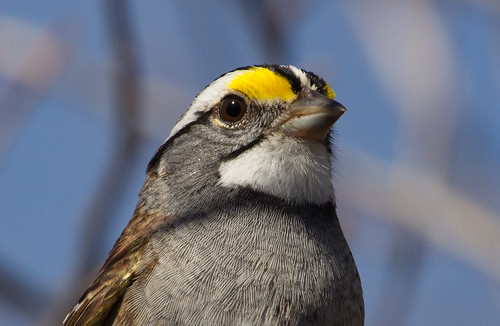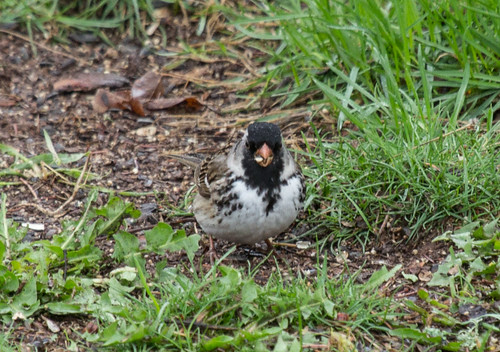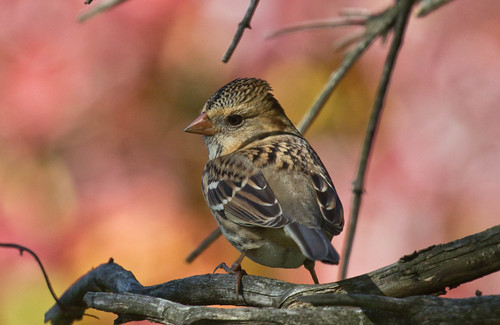 |
| Harris's Sparrow |
Most of my favorite sparrows belong to the genus Zonotrichia. This genus has five
species, all fairly large birds with conspicuous markings. The Rufous-collared
Sparrow is tropical.
The Golden-crowned Sparrow breeds in the Northwest and winters
along the Pacific slope from Canada to Baja California.
Eastern forms of the
White-crowned Sparrow breed in northern Canada, and western forms from Alaska down
through the mountains—they migrate through in the north woods, and once in a
while an individual spends the winter at a feeding station.
The White-throated
Sparrow breeds in the north woods, is an abundant migrant visiting our feeders
in huge numbers in spring and fall, and some winter here.
Harris’s Sparrow
breeds in the transition zone between the subarctic boreal forest and the Low
Arctic tundra of northern Canada. Some individuals stray into northeastern
Minnesota and northwestern Wisconsin every migration, en route to their
wintering grounds in the central states from South Dakota down through Texas
and northeastern-most Mexico. This is the only species considered endemic to
Canada, because it breeds nowhere else on the planet.
We in the upper Midwest get to see only a handful of Harris’s
Sparrows each year, and then only if we’re lucky. One or two turn up in my
mother-in-law’s feeding station in Port Wing, Wisconsin, every May and
September, and they usually turn up in my yard at the same time. They’re easy
to pick out among the many White-throated Sparrows, but finding them requires
that you actually look at each of those sparrows. I hear their song rarely in
spring, and I’ve never heard them sing in fall. Like the White-throated Sparrow’s
song, Harris’s Sparrow whistles and is easy to imitate. The notes are in a
minor key, giving the song a mournful quality. Its call note is pretty similar
to the White-throated Sparrow’s, but the quality is different enough that I
learned to distinguish them without any trouble, but I did pay attention to
both species to notice the quality differences. You can hear their songs, and
the songs of just about every North American bird, at Cornell’s wonderful www.AllAboutBirds.org.
George Miksch Sutton was the first white person to discover
a nest of Harris’s Sparrow, near Hudson Bay, in 1932. He wrote:
As I knelt to examine the nest a thrill the like of which I had never felt before passed through me. And I talked aloud! "Here!" I said. "Here in this beautiful place!" At my fingertips lay treasures that were beyond price. Mine was Man's first glimpse of the eggs of the Harris's Sparrow, in the lovely bird's wilderness home.
Sutton may have had the heart of a poet, but he had the
instincts of a 19th Century ornithologist, so he immediately shot
the mother and collected the nest and eggs. The bird itself had been
“discovered” for science in 1834, when Thomas Nuttall found one in Jackson
County, Missouri. Nuttall was a botanist who reportedly never carried a gun,
but someone in his party did, and so Nuttall’s bird lies in a drawer in the
Academy of Natural Sciences in Philadelphia, serving as the type specimen for
the species. I wish they’d kept Nuttall’s name for the bird—he called it the
Mourning Finch—but he also gave it the scientific name Zonotrichia querula, which is still its name. Querula is obviously related to “querulous,” which means
argumentative, but at that time it also meant whining, fretful, or lamenting,
Nuttall’s interpretation of the song. I know I’d be whining and fretful and
lamenting if I were a bird in a world where the most powerful species held my
life in so little regard. No wonder chickadees bite bird banders so viciously.
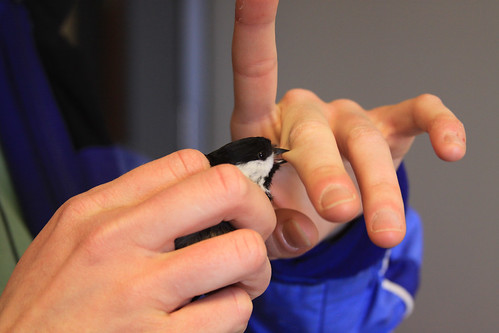 |
| Annoyed Black-capped Chickadee |
